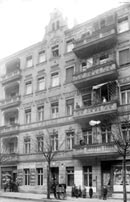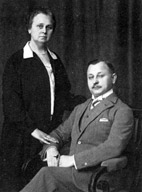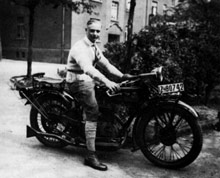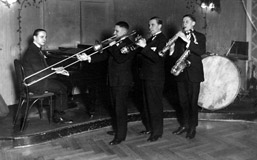Stephan Pflicht:
The Gerhard-Winkler-Chronicle
I. Childhood and youth
 1906
Gerhard Winkler was born as the only son of the locksmith Franz Winkler and
his wife Emma, née Geisler, on 12th September in Rixdorf near Berlin, Münchner
Straße 10 - from 1912 Neukölln; now Berlin-Tempelhof, Flughafenstrasse. 1906
Gerhard Winkler was born as the only son of the locksmith Franz Winkler and
his wife Emma, née Geisler, on 12th September in Rixdorf near Berlin, Münchner
Straße 10 - from 1912 Neukölln; now Berlin-Tempelhof, Flughafenstrasse.
1912
His mother and father stem from Silesia and play family music. They
both have good singing voices and his father also playing the zither.
They support their son's apparent musical talent and buy a piano for
him.
1913
at the primary school, where Gerhard Winkler has been going since 1912, a music
teacher supports his love of music over and above normal lessons, giving him
private tuition and plays the organ together with him. Gerhard Winkler composes
his first song with his own words: a song for zither called An
meinen Buchfink .
 1916
The local vicar notices the boy's good soprano voice during childrens'
services and so Gerhard Winkler joins the choir of the Christuskirche
in Neukölln. Gerhard Winkler asks for an audition with Professor Hugo
Rüdel, who conducts the Berliner Hof- und Domchor, (cathedral choir)
and is accepted. 1916
The local vicar notices the boy's good soprano voice during childrens'
services and so Gerhard Winkler joins the choir of the Christuskirche
in Neukölln. Gerhard Winkler asks for an audition with Professor Hugo
Rüdel, who conducts the Berliner Hof- und Domchor, (cathedral choir)
and is accepted.
1918
Early in the year the Berliner Hof- und Domchor goes on concert tour
in Switzerland. Gerhard Winkler belongs to the singers chosen for the
tour.
1919
during the early post-war years Gerhard Winkler sings with the children's choir
of the opera house in Berlin »Unter den Linden«, participating in
such operas as »Carmen«, »Der Wildschütz«, »Königskinder«
and »Der Evangelimann«. This will be the foundation of his love
of opera, awakening his ambition of becoming a singer.
1920-21
Gerhard Winkler is confirmed on 22nd September in the Dreifaltigkeitskirche
(Trinity Church) in Berlin. His voice breaks, putting an end to his
choir singing and his parents press him to take up a serious career.
In view of his musical talent he is to be apprenticed to a piano maker
and instrument dealer. During a visit to the company his father realises
how physically strenuous piano transporting is. He doesn't want to put
his son to this and decides to send him into the trade of music supply.
Gerhard Winkler
takes up his apprenticeship with the Berlin music publisher Richard
Birnbach, going on to join the retailer and publisher Robert Rühle after
a few months, where he is employed as apprentice from 1st October 1920
to 30th September 1922.
1922 On
1st October Gerhard Winkler starts working as assistant for his master
on a half day basis, thus being given the opportunity of pursuing his
private music studies in the afternoons. He now pays regular visits
to the Englersche Konservatorium at Zossener Strasse 55 and studies
piano and violin under Professor Richard Engler as well as music theory
and composition under Professor Friedrich Hoyer.
1923
On 14th April the students of the academy give a concert in the Askanische Gymnasium
(Askan High School) in Berlin, where the chamber music suite Im
Maien is played, including the movements Springendes
Bächlein, Blütenduft and Abschied.
This is the first public performance of a Gerhard Winkler composition.
On 31st August Gerhard
Winkler leaves the retailer and publisher Robert Rühle in order to dedicate
himself solely to his musical education at the Englersche Music Academy.
Attempts at establishing
himself with choir and piano music fail so that Gerhard Winkler turns
to music for dance and entertainment.
1924-30 Gerhard
Winkler himself described this period in his life as the years of apprenticeship
and travel. He seeks to prove himself in practise and takes every opportunity
of playing in Berlin pubs and taverns and at private celebrations, collecting
experience on the piano. He also studies the »Kinothek«, a collection
of themes edited by Guiseppe Becce, composer and musical director, to accompany
silent movies and he uses this experience as a pianist in silent movie cinemas.
Gerhard
Winkler then works as pianist and composer in spa orchestras, dance bands, café
and bar ensembles, as for example the Binz spa orchsetra on Rügen and soon after
his own band in the Weinhaus Traube and the Arcadia Bar in Essen. He is introduced
to the famous dance and show orchestra Hans Bund and Bernhard Etté and composes
arrangements for them from his unpublished dance composition Trance
Blues .
 At
the age of 18 Gerhard Winkler buys his first motor bike in Essen, a
350 ccm engine, which he proudly describes in his autobiographical sketches. At
the age of 18 Gerhard Winkler buys his first motor bike in Essen, a
350 ccm engine, which he proudly describes in his autobiographical sketches.
He is asked to play
on the Island of Norderney, in Mannheim, Elberfeld, Wiesbaden and Mainz.
When Julian Fuh's orchestra plays in nearby Frankfurt, Gerhard Winkler
travels there especially to learn the so-called jazz symphonic style
of this orchestra.
The
first print editions of Gerhard Winkler's compositions were the waltz songs
In meinem Herzen klingt ein kleines Lied and
Heut ist uns alles egal, published
in 1930 by F.Marxen in Mainz.
1931
After having got into contact with the Berlin music publisher Ernst Wengraf,
for whose Monopol_Liederverlag he writes several orchestra arrangements as well
as some of his own songs, Gerhard Winkler returns to Berlin. Here he has his
first big success with the students' song potpourri in three quarter time Es
zogen drei Burschen, which appears in print just like his foxtrott
Ein Glas voll mit Wein,
published by the Monopol-Liederverlag.
Gerhard Winkler
also leads a dance band, works as cabaret piano player and accompanies
songs, appearing with, e.g. Otto Reutter, Claire Waldorf, Martha Hühner
and Hedda Herrnfeld.

|

![]()



